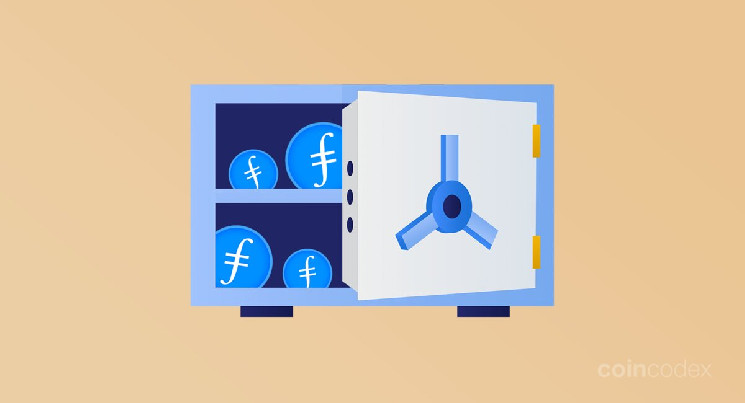Filecoin staking makes it possible for storage providers to borrow FIL from users and use the coins as collateral. In return, users receive a portion of the FIL rewards earned by storage providers. We’ll show you how to stake Filecoin and earn FIL rewards.
We’ll highlight multiple ways in which you can stake Filecoin. You can stake your FIL on a centralized crypto exchange, or use one of the many decentralized protocols that have been enabled by the launch of the Filecoin Virtual Machine.
Before we dive deeper into the topic of Filecoin staking, let’s quickly learn a bit about the Filecoin Virtual Machine.
Filecoin Virtual Machine (FVM)
The Filecoin Virtual Machine was officially launched on the Filecoin mainnet in March 2023, delivering smart contracts support and user programmability. While the Filecoin Virtual Machine can be very flexible, the first runtime it supports is the Ethereum Virtual Machine (EVM). This means that you can use a wallet such as MetaMask to interact with the various Filecoin staking protocols.
How to stake Filecoin
Now that the Filecoin Virtual Machine is live, various protocols have been launched that allow users to stake FIL and earn rewards. In this article, we’ll show you how to stake Filecoin using the Glif protocol as an example. We’ll be using the MetaMask wallet.
However, we’ll also highlight a few other options, as the Filecoin ecosystem is very lively and users can choose between a multitude of staking protocols.
Add the Filecoin network to your MetaMask wallet
Go to the “Settings” Section of your MetaMask wallet and select “Networks”.
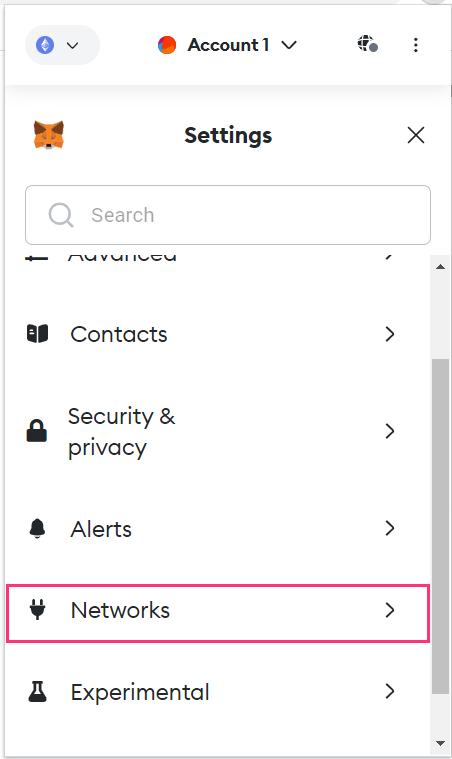
Then, click the “Add network” button.
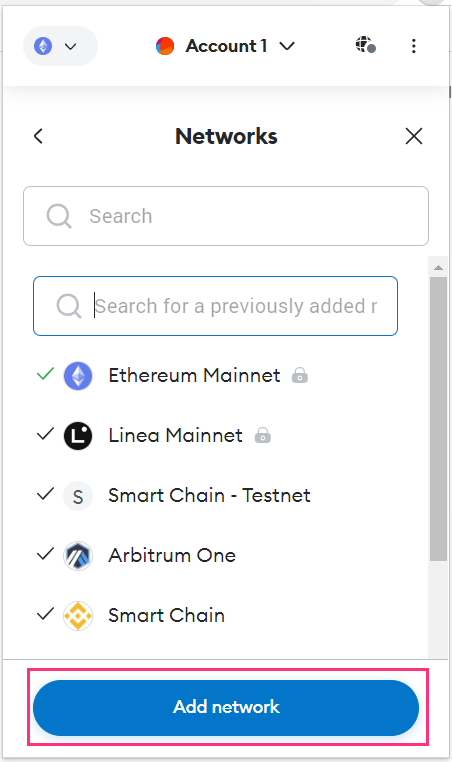
Now, click on “Add a network manually”.
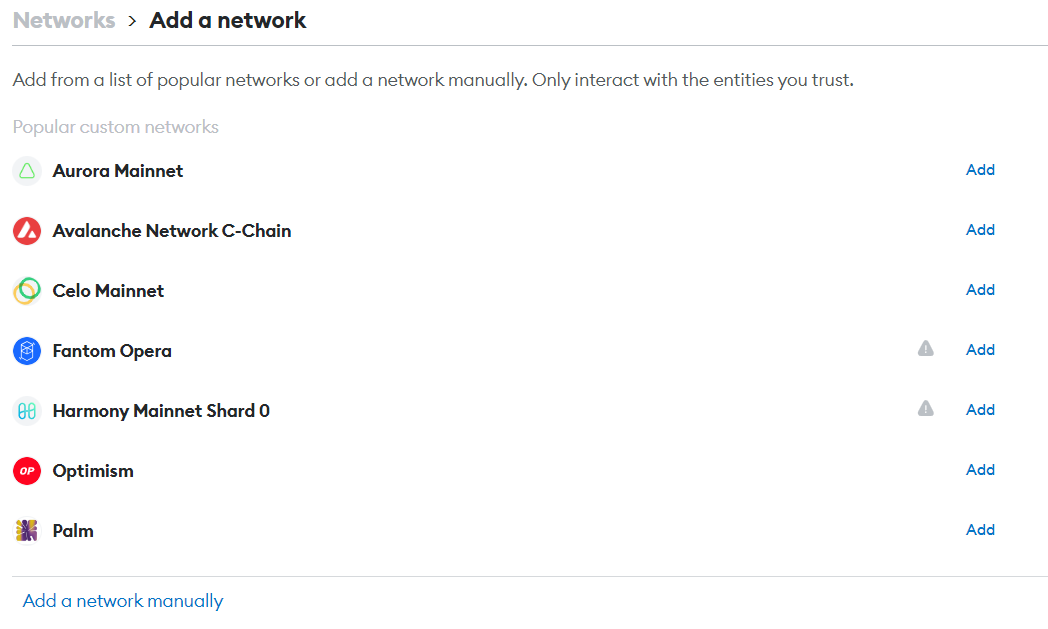
Input the following information:
- Network name: Filecoin
- New RPC URL: https://filecoin.chainup.net/rpc/v1
- Chain ID: 314
- Currency symbol: FIL
- Block explorer URL: https://filfox.info/
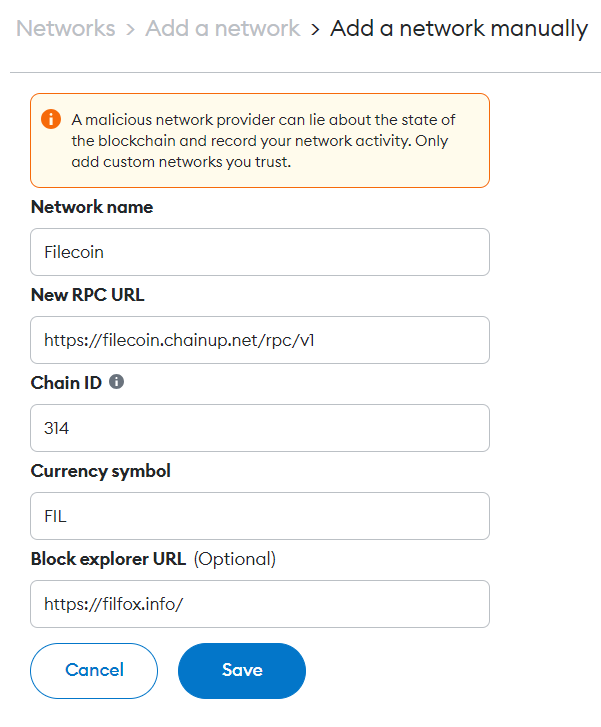
Please note that you can choose a different RPC URL or Block explorer URL if you wish. You can find a list of different Filecoin RPCs and block explorers online.
After you input the information, MetaMask will inform you that you’ve successfully added the Filecoin network. Then, you’ll be presented with the option to switch over to Filecoin.
Head over to the Glif website and stake your FIL
Now that your MetaMask wallet is ready to work with Filecoin, you can stake your Filecoin. Of course, you’ll need to buy some FIL coins first to fund your wallet. You can buy FIL on a cryptocurrency exchange — we provide a list of the best cryptocurrency exchanges to help you choose the exchange that’s right for you.
Then, head over to the glif.io website to access the project’s Infinity Pool.
Glif’s Filecoin staking solution works through iFIL, which is a liquid staking token. When you deposit your FIL into the Infinity Pool staking pool, you will receive an equivalent amount of iFIL.
You can use your iFIL tokens as you please — for example, you could hold it in your wallet, swap it on a decentralized exchange, or deposit it into a DeFi lending protocol.
iFIL tokens can be redeemed for FIL tokens that are deposited in the Infinity Pool. The amount of FIL that can be redeemed in exchange for 1 iFIL grows over time, which is how the rewards earned by stakers are materialized. Your Filecoin staking APY will depend on supply and demand and will fluctuate over time.
Once you’re ready to start staking your FIL, connect your MetaMask wallet and input the amount of FIL you would like to stake. Click “Deposit” and then confirm the transaction using your wallet.
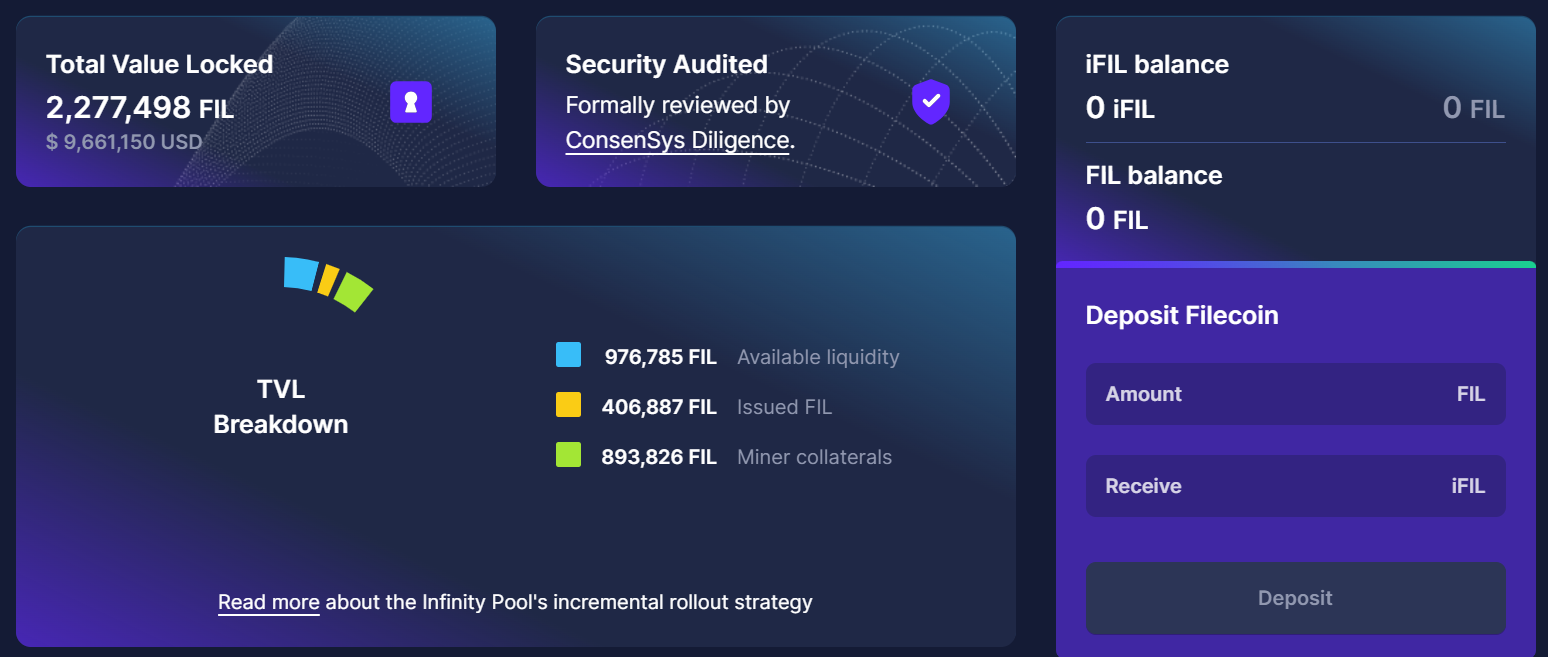
Alternative Filecoin staking options
As we’ve said before, there’s many different protocols that allow you to stake FIL and earn rewards. We’ll be highlighting 3 more alternatives to Glif.
Collectif
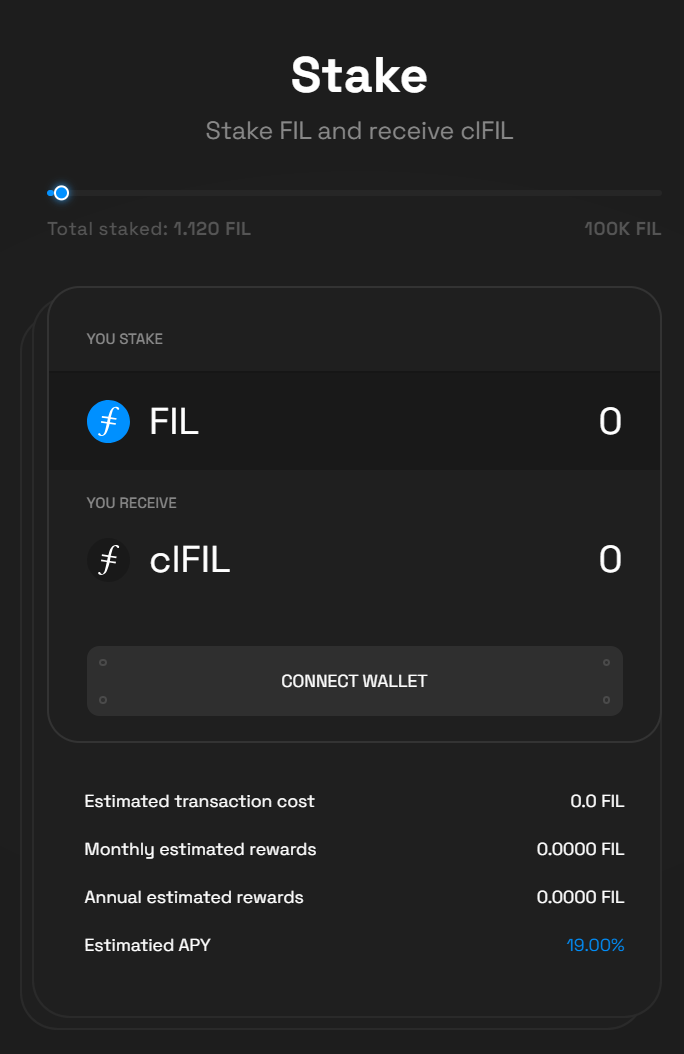
Collectif is a liquid staking protocol for Filecoin. When users stake FIL with Collectif, they receive cIFIL tokens in return. You can access Collectif’s staking protocol through their official website.
The Collectif protocol distributes 60% of the earned rewards to storage providers, while the remaining 40% goes to stakers. The protocol itself does not collect a fee. At the time of writing, stakers on Collectif are earning an estimated APY of about 18.7%, although the rewards rate does fluctuate depending on market conditions.
stFIL
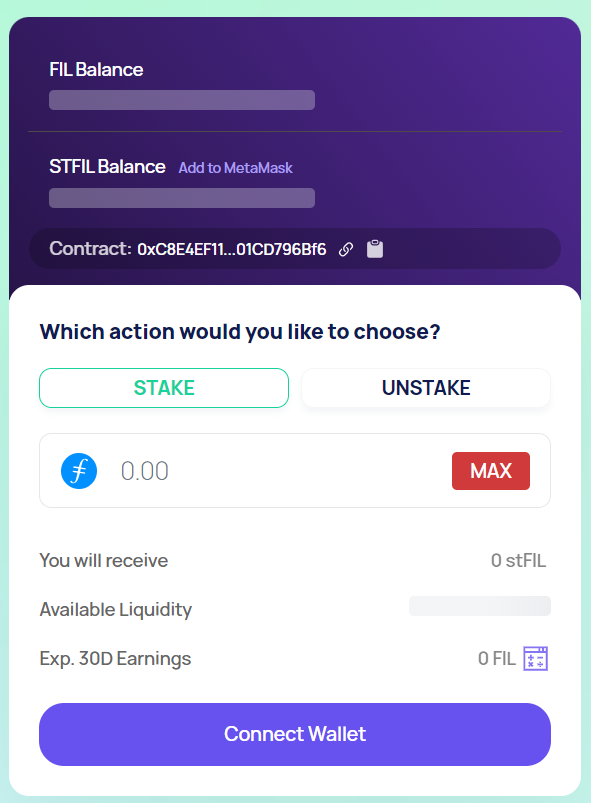
stFIL is a Filecoin staking solution powered by the stFIL token. Users who deposit FIL into the smart contract receive an equivalent amount of stFIL tokens, which accrues rewards and can be used freely in other on-chain applications. When users wish to collect their rewards, they can swap their stFIL back for an equivalent amount of FIL.
With the stFIL protocol, users can stake or unstake their FIL at any time. At the time of writing, the protocol has roughly 726,000 FIL staked, which translates to about $3 million.
Filet Finance
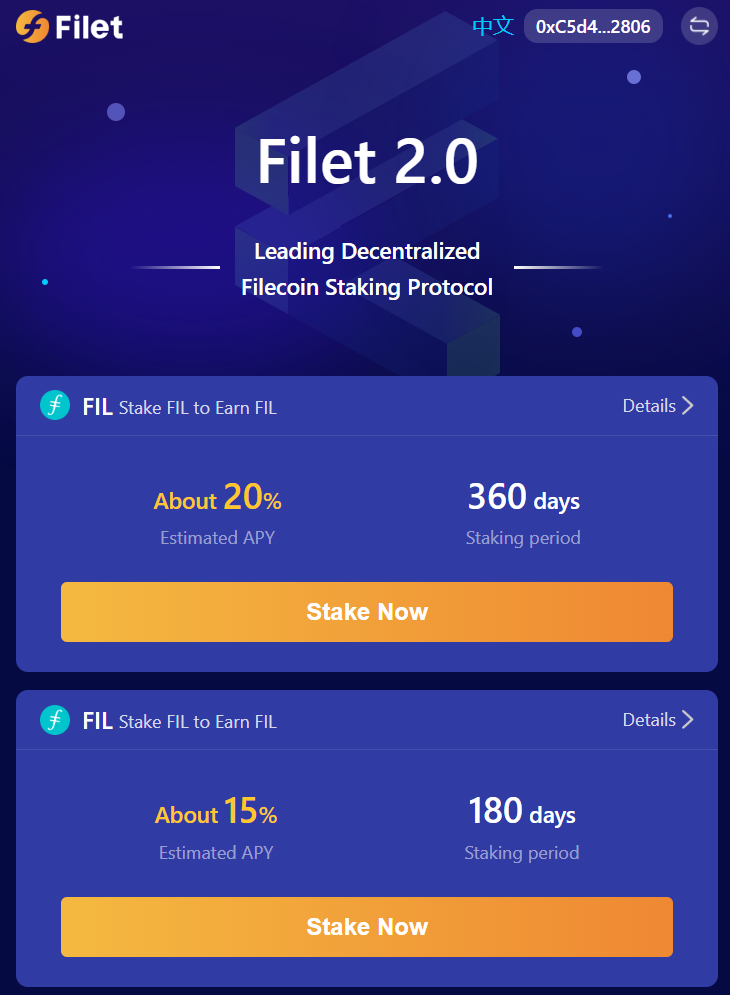
Filet Finance is a platform that provides various services for the Filecoin ecosystem. This includes a Filecoin staking service, which currently provides 180-day and 360-day staking period options.
The longer the lock-up duration, the higher APY Filecoin stakers can expect to earn. Filet Finance also provides a Filecoin staking service with a flexible staking period, although it offers lower returns.
While the APYs offered by the fixed staking periods on Filet Finance are relatively high, the service is not quite as flexible as the liquid staking solutions that we have featured so far.
If you’re looking for even more Filecoin staking options, you can view a comprehensive list of available protocols in this article published on the official Filecoin website.
Staking Filecoin on Binance or other exchanges
Another alternative method of staking Filecoin is to use centralized exchanges that offer crypto staking services. One example of a cryptocurrency exchange where you can stake FIL is Binance.
At the time of writing, Filecoin is offering FIL staking through its Simple Earn product. Currently, the exchange offers flexible Filecoin staking, but users can also choose between 30-day, 60-day and 120-day fixed staking options. The longer the lock-up period, the more rewards you can expect to earn.
Stake Filecoin on Binance
Staking Filecoin through Binance is very convenient, but the APY you will earn is likely going to be much lower than what you’d get with decentralized services such as Glif, Collectif and stFIL.
The bottom line
As you can see, there’s quite a few Filecoin staking options available on the market. The various options are different from each other in terms of liquidity, lock-up periods, expected APY, staking token mechanisms and other factors. The choice of which Filecoin staking service to use will depend on which of these categories you prioritize.
If you’re interest in more ways to earn FIL, make sure to check out our article exploring the topic of Filecoin mining.
 coincodex.com
coincodex.com
